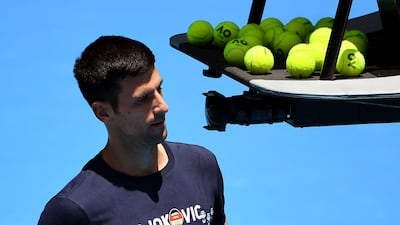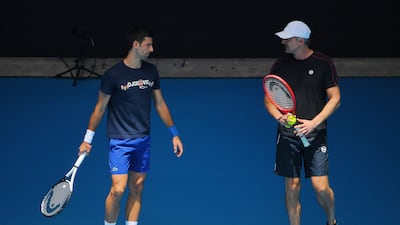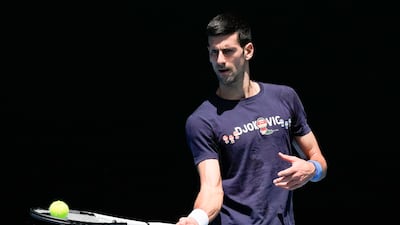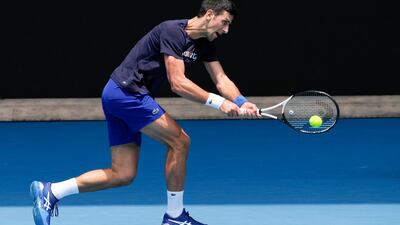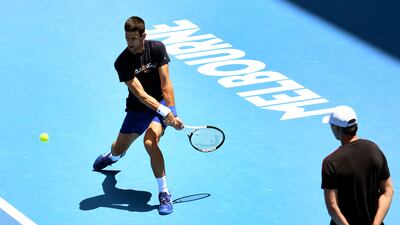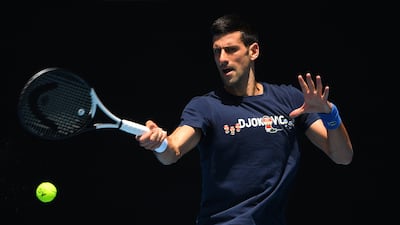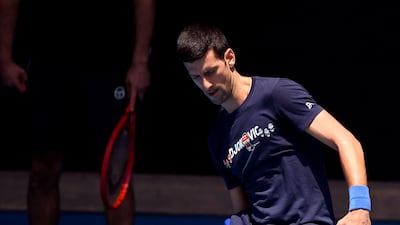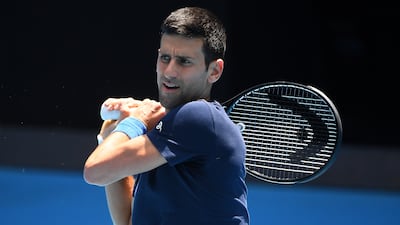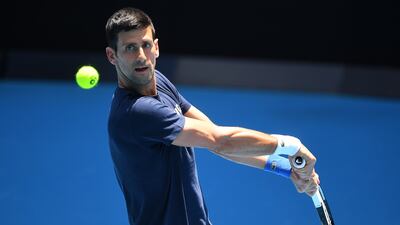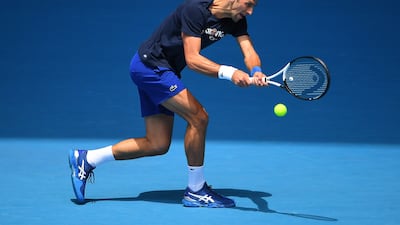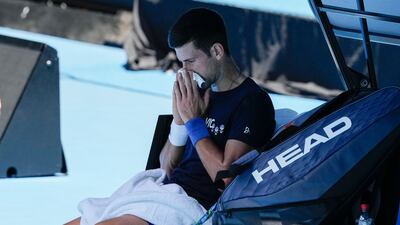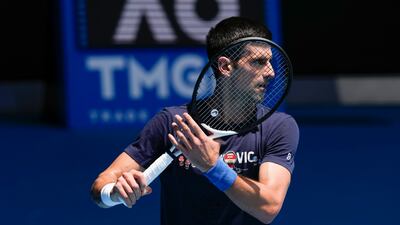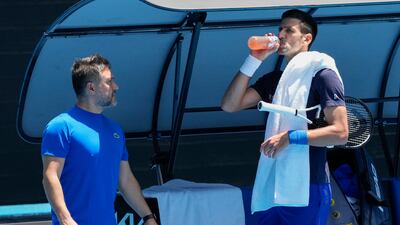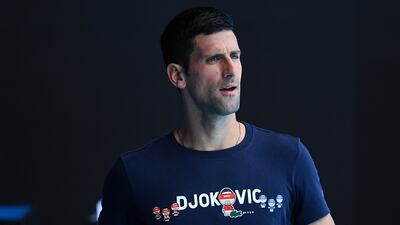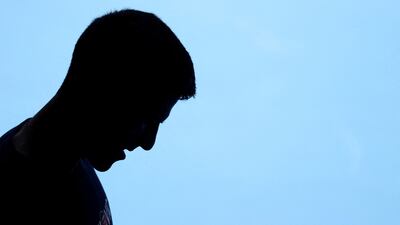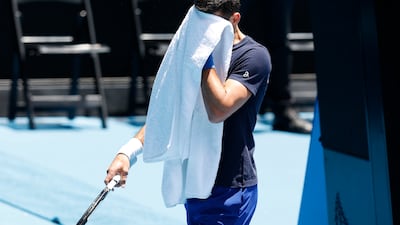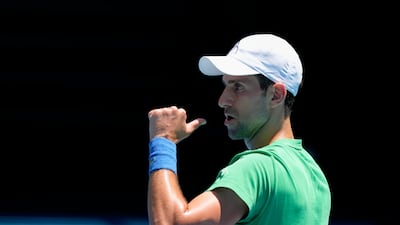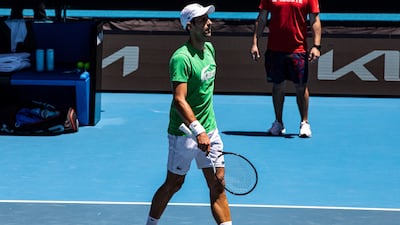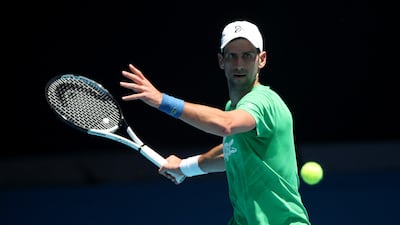Latest: Novak Djokovic set to board flight to Dubai after losing Australian visa appeal
Novak Djokovic said he was disappointed that a court on Sunday dismissed his challenge to a deportation order and accepted his hopes of defending his Australian Open title were over.
The world No 1 released a statement shortly after three Federal Court judges unanimously upheld a decision made on Friday by Immigration Minister Alex Hawke to cancel the 34-year-old Serb’s visa on public interest grounds because he is not vaccinated against Covid-19.
“I am extremely disappointed with the Court ruling to dismiss my application for judicial review of the Minister’s decision to cancel my visa, which means I cannot stay in Australia and participate in the Australian Open,” Djokovic said.
“I respect the Court’s ruling and I will cooperate with the relevant authorities in relation to my departure from the country,” he added.
Djokovic said he was “uncomfortable” that the focus had been on him since his visa was first cancelled on arrival at Mebourne's airport on January 6.
“I hope that we can all now focus on the game and tournament I love,” he said.
The decision likely means that Djokovic, who is not vaccinated against Covid-19, will remain in detention in Melbourne until he is deported.
Deportation usually occurs as soon as possible after an order unless prevented by court action. The government has not said when Djokovic will leave.
A deportation order usually also includes a three-year ban on returning to Australia.
Chief Justice James Allsop said the ruling came down to whether the minister's decision was "irrational or legally unreasonable.”
Hawke welcomed the decision, saying: “Australia’s strong border protection policies have kept us safe during the pandemic, resulting in one of the lowest death rates, strongest economic recoveries, and highest vaccination rates in the world.
“Strong border protection policies are also fundamental to safe-guarding Australia’s social cohesion which continues to strengthen despite the pandemic,” he added.
Djokovic could potentially appeal to the High Court, but not in time for him to compete in the Australian Open, which begins Monday.
“I will now be taking some time to rest and to recuperate, before making any further comments beyond this,” he said.
The court process that Djokovic had hoped would keep his aspirations alive for a 21st Grand Slam title was extraordinarily fast by Australian standards.
Within three hours of Hawke's announcement on Friday afternoon that Djokovic's visa was canceled, his lawyers went before a Federal Circuit and Family Court judge to initiate their challenge to the decision. The case was elevated to the Federal Court on Saturday and submissions were filed by both sides that same day.
The three judges heard the case over five hours on Sunday and announced their verdict two hours later.
Djokovic, 34, has won the Australian Open the past three years and was a strong favourite to claim a record-extending 10th Melbourne Park crown.
The top seed was set to face Miomir Kecmanovic in his opening match at Rod Laver Arena on Monday.
Tennis Australia had no immediate comment on the star player's legal defeat.
Hawke cancelled the visa on the grounds that Djokovic’s presence in Australia may be a risk to the health and “good order” of the Australian public and “may be counterproductive to efforts at vaccination by others in Australia.”
Djokovic’s visa was initially cancelled on January 6 at Melbourne’s airport hours after he arrived to compete in the first Grand Slam of 2022.
A border official cancelled his visa after deciding Djokovic didn’t qualify for a medical exemption from Australia’s rules for unvaccinated visitors.
After spending four days in an immigration detention centre, Djokovic, 34, won his appeal after the court quashed the revocation before it was cancelled a second time on Friday.
Six large-scale objects on show
- Concrete wall and windows from the now demolished Robin Hood Gardens housing estate in Poplar
- The 17th Century Agra Colonnade, from the bathhouse of the fort of Agra in India
- A stagecloth for The Ballet Russes that is 10m high – the largest Picasso in the world
- Frank Lloyd Wright’s 1930s Kaufmann Office
- A full-scale Frankfurt Kitchen designed by Margarete Schütte-Lihotzky, which transformed kitchen design in the 20th century
- Torrijos Palace dome
Squads
Australia: Finch (c), Agar, Behrendorff, Carey, Coulter-Nile, Lynn, McDermott, Maxwell, Short, Stanlake, Stoinis, Tye, Zampa
India: Kohli (c), Khaleel, Bumrah, Chahal, Dhawan, Shreyas, Karthik, Kuldeep, Bhuvneshwar, Pandey, Krunal, Pant, Rahul, Sundar, Umesh
A new relationship with the old country
Treaty of Friendship between the United Kingdom of Great Britain and Northern Ireland and the United Arab Emirates
The United kingdom of Great Britain and Northern Ireland and the United Arab Emirates; Considering that the United Arab Emirates has assumed full responsibility as a sovereign and independent State; Determined that the long-standing and traditional relations of close friendship and cooperation between their peoples shall continue; Desiring to give expression to this intention in the form of a Treaty Friendship; Have agreed as follows:
ARTICLE 1 The relations between the United Kingdom of Great Britain and Northern Ireland and the United Arab Emirates shall be governed by a spirit of close friendship. In recognition of this, the Contracting Parties, conscious of their common interest in the peace and stability of the region, shall: (a) consult together on matters of mutual concern in time of need; (b) settle all their disputes by peaceful means in conformity with the provisions of the Charter of the United Nations.
ARTICLE 2 The Contracting Parties shall encourage education, scientific and cultural cooperation between the two States in accordance with arrangements to be agreed. Such arrangements shall cover among other things: (a) the promotion of mutual understanding of their respective cultures, civilisations and languages, the promotion of contacts among professional bodies, universities and cultural institutions; (c) the encouragement of technical, scientific and cultural exchanges.
ARTICLE 3 The Contracting Parties shall maintain the close relationship already existing between them in the field of trade and commerce. Representatives of the Contracting Parties shall meet from time to time to consider means by which such relations can be further developed and strengthened, including the possibility of concluding treaties or agreements on matters of mutual concern.
ARTICLE 4 This Treaty shall enter into force on today’s date and shall remain in force for a period of ten years. Unless twelve months before the expiry of the said period of ten years either Contracting Party shall have given notice to the other of its intention to terminate the Treaty, this Treaty shall remain in force thereafter until the expiry of twelve months from the date on which notice of such intention is given.
IN WITNESS WHEREOF the undersigned have signed this Treaty.
DONE in duplicate at Dubai the second day of December 1971AD, corresponding to the fifteenth day of Shawwal 1391H, in the English and Arabic languages, both texts being equally authoritative.
Signed
Geoffrey Arthur Sheikh Zayed
How to help
Call the hotline on 0502955999 or send "thenational" to the following numbers:
2289 - Dh10
2252 - Dh50
6025 - Dh20
6027 - Dh100
6026 - Dh200
Milestones on the road to union
1970
October 26: Bahrain withdraws from a proposal to create a federation of nine with the seven Trucial States and Qatar.
December: Ahmed Al Suwaidi visits New York to discuss potential UN membership.
1971
March 1: Alex Douglas Hume, Conservative foreign secretary confirms that Britain will leave the Gulf and “strongly supports” the creation of a Union of Arab Emirates.
July 12: Historic meeting at which Sheikh Zayed and Sheikh Rashid make a binding agreement to create what will become the UAE.
July 18: It is announced that the UAE will be formed from six emirates, with a proposed constitution signed. RAK is not yet part of the agreement.
August 6: The fifth anniversary of Sheikh Zayed becoming Ruler of Abu Dhabi, with official celebrations deferred until later in the year.
August 15: Bahrain becomes independent.
September 3: Qatar becomes independent.
November 23-25: Meeting with Sheikh Zayed and Sheikh Rashid and senior British officials to fix December 2 as date of creation of the UAE.
November 29: At 5.30pm Iranian forces seize the Greater and Lesser Tunbs by force.
November 30: Despite a power sharing agreement, Tehran takes full control of Abu Musa.
November 31: UK officials visit all six participating Emirates to formally end the Trucial States treaties
December 2: 11am, Dubai. New Supreme Council formally elects Sheikh Zayed as President. Treaty of Friendship signed with the UK. 11.30am. Flag raising ceremony at Union House and Al Manhal Palace in Abu Dhabi witnessed by Sheikh Khalifa, then Crown Prince of Abu Dhabi.
December 6: Arab League formally admits the UAE. The first British Ambassador presents his credentials to Sheikh Zayed.
December 9: UAE joins the United Nations.
BUNDESLIGA FIXTURES
Saturday, May 16 (kick-offs UAE time)
Borussia Dortmund v Schalke (4.30pm)
RB Leipzig v Freiburg (4.30pm)
Hoffenheim v Hertha Berlin (4.30pm)
Fortuna Dusseldorf v Paderborn (4.30pm)
Augsburg v Wolfsburg (4.30pm)
Eintracht Frankfurt v Borussia Monchengladbach (7.30pm)
Sunday, May 17
Cologne v Mainz (4.30pm),
Union Berlin v Bayern Munich (7pm)
Monday, May 18
Werder Bremen v Bayer Leverkusen (9.30pm)
A Cat, A Man, and Two Women
Junichiro Tamizaki
Translated by Paul McCarthy
Daunt Books
More from Rashmee Roshan Lall
A State of Passion
Directors: Carol Mansour and Muna Khalidi
Stars: Dr Ghassan Abu-Sittah
Rating: 4/5
Zayed Sustainability Prize
Rashid & Rajab
Director: Mohammed Saeed Harib
Stars: Shadi Alfons, Marwan Abdullah, Doaa Mostafa Ragab
Two stars out of five
Killing of Qassem Suleimani
KILLING OF QASSEM SULEIMANI














